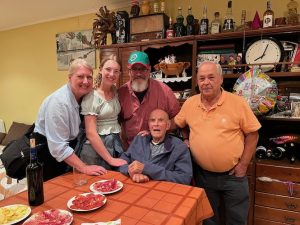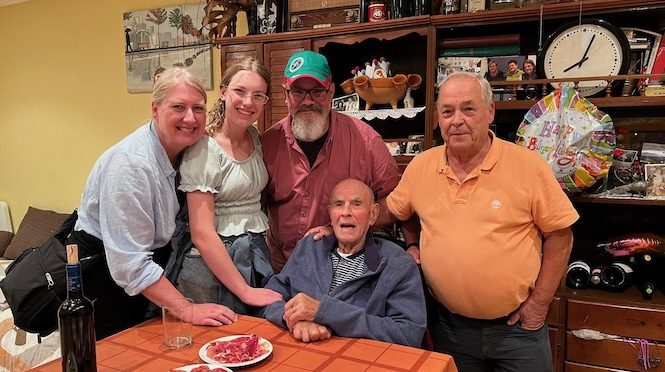We spent the next day, the day after seeing Bilbo, with family. In the morning, we met my dad’s sister Begoña and her family in Gernika. The rest of the family slowly found us throughout the morning and early afternoon as we wandered the city, stopping by the Tree of Gernika and a statue of Jose Mari Iparragirre. We all gathered outside of Gernika for lunch, a monumental event that started at about 2 pm and ended around 7. Almost all of the family was there – my dad’s two sisters Begoña and Rosario, his brother José Luis, and a multitude of cousins and now grandkids too. But, my dad’s uncle, Tio Joe, couldn’t join us as he is just too weak. So, after lunch, we headed to Rosario’s house, where Tio Joe lives, to have even more food and to visit with Tio Joe. Tio Joe turns 99 this December and though his body has gotten weaker, his mind is still sharp.

- Tio Joe was born on December 26, 1924, in Goikoetxebarri – the farmhouse my dad grew up in – in Munitibar. His full name is Juan José Uberuaga Urionaguena, but because he had a brother also named Juan, he goes by José, or Joe in the United States.
- Tio Joe spent his whole life working – he never attended high school. He would work on the family baserri cutting grass, milking cows, and the like. When he was 12, he spent two years working in Gipuzkoa for 100 pesetas a year.
- In 1952, when he was 28 years old, he came to the United States. He had a few uncles already in the US, one of which was the owner of the Uberuaga boarding house in Boise. Particularly during Christmas break, when he got 10 days, he would return to that boarding house. He remembers playing cards and socializing with other Basques, and the great food that his aunt Hermengilda would make. The only big rule that they had at the boarding house was that the boarders couldn’t take girls upstairs.
- Tio Joe first worked for the Archibal sheep outfit. After a few years, he moved on to the Richardson feedlot in Caldwell, Idaho, owned by Simplot. Two years later, he began working for Boise Cascade as a logger, which he did with a number of other Basques. After a few other short-term jobs, Tio Joe ended up at the plywood mill in Emmett, Idaho, where he worked until an accident forced him into disability.
- Tio Joe visited us often when I was a kid. My dad always called him Tio, so I just assumed that was his name, so I would call him Uncle Tio. He drove a flashy and always polished bright red car with white trim. His biceps were huge and he would always tease us that he got those biceps by eating eggs whole and that’s what we saw when he flexed his arm – the eggs. In 1984, Tio Joe moved back to the Basque Country, where he has been ever since.
- Tio Joe was the catalyst that brought his brothers to the United States to also herd sheep. His brother Juan returned after only a few years but his brother Santiago stayed the rest of his life, making his home in Boise. Tio Joe and his brothers were also the reason that my dad came, again enticed by making a better life than seemed possible in the Basque Country.
Primary source: An Interview with Juan Jose Uberuaga, Boise Basque Museum



Osaba Joe doesn’t have the same rhyme as Tio Joe…
It doesn’t – but I’ve hardly ever heard anyone say osaba… they all say tio… 🙂